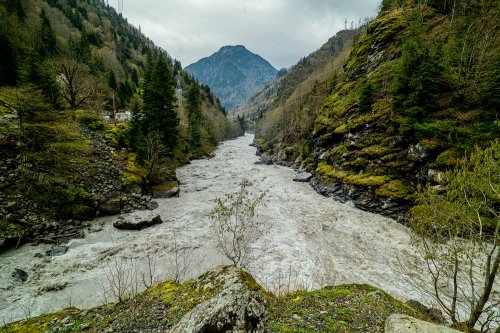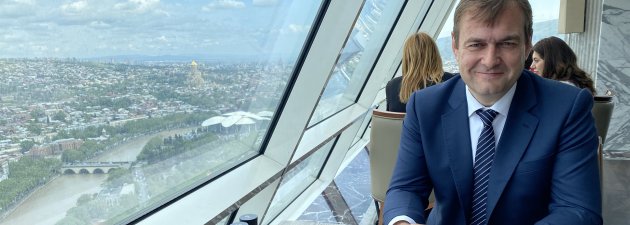We’ve had another opportunity to talk to one of the founders of Georgia Energy SICAV, an investment fund focused on building hydroelectric power plants in Georgia. Daniel Mahovský divides his time between the Czech Republic, where he is currently in charge of design work and technology supply tenders, and Georgia, where he is putting finishing touches on several hydropower projects and is also working on solar projects.
We have to defend our project in front of the public
We presented your activities to TRADE NEWS readers in the September 2022 issue. What has changed for you since then?
We keep working on our constructions. We are currently developing six hydropower plants and one solar power plant. By the time this interview comes out, we should have memorandums approved by the Georgian government for the construction of two small hydropower plants. These are similar to zoning decisions as we know them from the Czech system. In Georgia, these memorandums allow us to start buying up land that is mostly owned by the state. We will also have had a public hearing on another project, which should move us further in the environmental impact assessment process.
What exactly should we imagine under the term public hearing and how important is it in the process of building a power plant?
As the name suggests, it is a meeting with the public, organized by the Georgian Department of Environmental Protection and Agriculture. It is attended by residents of the municipalities affected by the construction, representatives of the ministry and investor companies. The meeting aims to familiarize the participants with the proposed construction, and to collect relevant comments that may still impact the shape of the building as such. The result is then directly included in the environmental impact assessment, so we communicate with the affected municipalities even before the meeting takes place. Any underestimation of this factor can have huge consequences for an inexperienced investor and may very quickly turn any project to failure already in the preparatory phase.

The Georgian Ministry of Economy and Sustainable Development reports that out of more than 20,000 rivers in the country, 300 have the potential for energy use.
Huge opportunities and a certain amount of risk. Quality insurance is a must
Elsewhere in this issue, we mention that the Georgian economy is gaining momentum. There has been a huge interest in Georgia among foreign investors over the last year, and tourism has increased dramatically. This surely has to do with the Russian aggression in Ukraine. How has this affected your activities? Have you seen any increase in property prices for example?
We typically operate in Tbilisi and then in the mountains north of Kutaisi, where we mostly focus our projects. In Tbilisi, we have indeed seen a price increase in rents and services, which in our case mainly means higher transport costs. Once you leave the capital or larger cities in general, there is no difference to be seen. Our design work is done in the Czech Republic, and we use technologies from the Czech Republic and Austria. We thus expect only a slight increase in the price of construction work, but that’s something you have to count with these days.
Do you see the Georgian business environment as stable, in terms of territorial risk in particular?
That's a question we've been getting a lot over the past year. As for the business environment as such, I do consider Georgia to be one of the best countries for doing business. This has also been confirmed by many reputable global rankings. In any country with great potential, there are also some risks involved, otherwise it would not offer such opportunities. We are insured through Lloyd's of London.
Solar power stations? Use your experience
You have mentioned that you are also working on building a solar power plant. Is Georgia suitable for photovoltaics?
That certainly cannot be said for the country as a whole. There are places suitable for photovoltaics, such as the belt stretching through the lowlands from the Black Sea coast to the interior. This also applies to our project. But the conditions change significantly in the mountains, which are more suitable for hydropower plants. That is also why there are a lot fewer solar power plants in Georgia than, for example, in the Czech Republic. It is a competitive advantage for us. In our team, we have experience building solar power plants in the Czech Republic, Slovakia, but also Bulgaria.
Some say Georgia may soon be the largest per capita producer of green energy in the world. What is your view on this?
Yes, the overall potential is really heading there. It is also one of the reasons why the EU is interested in building a cable between Romania and Georgia. On top, this project has massive support from the World Bank. For us, it would mean that we could sell green electricity from Georgia to the Czech Republic in the future. Although it may sound like science fiction at the moment, there is a feasibility study currently being finalised by an Italian consulting firm, and according to the information we have, everything is very well on track.
How do you manage projects remotely? You must be moving around a lot, right?
The closer we get to obtaining the building permit, the more we travel, and after the construction begins, we will probably spend most of the year in Georgia to have 100% supervision over the process. We appreciate the relative proximity, as direct flights take just over three hours. It’s not like traveling to a different continent across the ocean. Plus, Georgia is similar in size to the Czech Republic, so getting around the country is quite easy time-wise.
What are your plans for future projects?
We have always claimed that we want to design projects, build them and then keep them as long as possible. Hydropower plants in particular have such a long lifespan that it’s safe to say that their future will be decided by my great-grandchildren. And my colleagues and I will be happy to know that we have built something in this world that is not harmful to the environment, that helps local residents, increases energy self-sufficiency of Georgia, while generating a solid ROI.
Mr. Mahovský was interviewed by Jana Jenšíková
Photo credits: Daniel Mahovský



